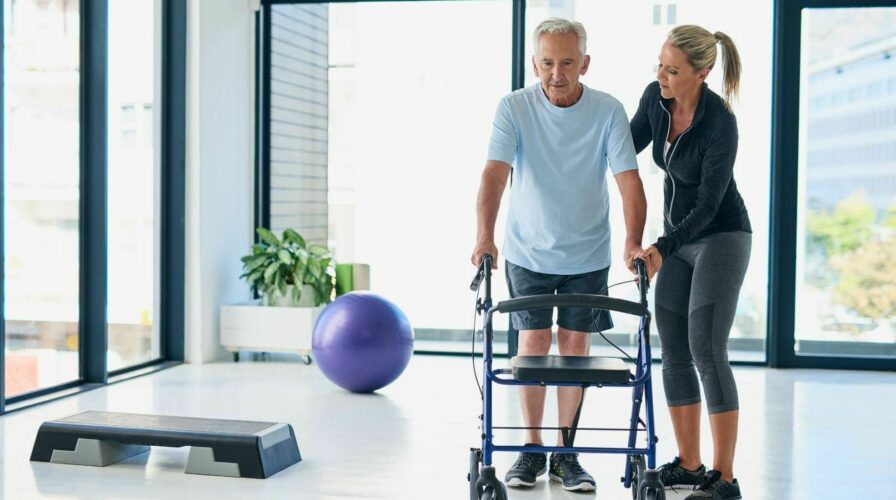
Recovering from a Spinal Cord Injury
While there are many causes of spinal cord injury (or SCI), injuries often result from a spinal tumor or from external trauma, such as a fall, severe car accident, sports-related incident, gunshot wound, or combat injury. There are two types of SCIs—complete and incomplete—and four levels of injury based on the location of the trauma: cervical, thoracic, lumbar, and sacral. Complete spinal cord injuries cause permanent damage to the spinal cord and result in paraplegia or tetraplegia. Incomplete spinal cord injuries result in partial damage to the spinal cord, which means patients retain some motor or sensory function below the affected spinal area. Because each section of the spine protects different groups of nerves that control the body, SCI patients’ treatment outcomes often depend on the location of their injury.
Many SCI patients have difficulty with sensation (including the ability to feel heat or cold), movement, spasticity, completing daily tasks, breathing, muscle control, speaking and swallowing, and pain management. For these patients, the journey toward recovery can feel overwhelming, but at Reunion, you’ll never have to make that journey alone. Our interdisciplinary team will work together to curate a treatment plan around your needs and goals, then walk alongside you on the path toward healing.
Why Inpatient Rehabilitation?
As you begin spinal cord injury recovery, your doctor may recommend treatment in an inpatient rehabilitation hospital (IRH) or a skilled nursing facility (SNF). While both IRHs and SNFs provide patients with occupational, physical, and speech therapy, patients in skilled nursing facilities work with therapists for only three to five hours a week, and patients in IRHs (such as Reunion) work with therapists for fifteen intensive hours each week. Medical studies have also shown that patients who recover in an IRH live longer, return to the community sooner, and have fewer ER visits and hospitalizations than patients treated in an SNF.
What to Expect at Reunion
If you choose to recover at a Reunion Rehabilitation Hospital, our team will provide you with three types of therapy: physical, occupational, and speech therapy. During admission, they will conduct an evaluation of your current physical limitations and needs. The day after admission, you will begin 60-90 minutes therapy sessions completing evidence-based techniques designed to improve your movement, breathing, and pain management.
Physical Therapy
During SCI recovery, you will use physical therapy to increase your strength and improve your heart and lung health. Our therapists use a partial-weight-bearing treadmill as a means of strengthening nerve connectivity above the site of the traumatic injury to improve movement. In functional electrical stimulation therapy (or FES therapy), they also use pulses of electrical currents to stimulate your nerves and re-educate weak or paralyzed muscles.
Occupational Therapy
In occupational therapy, you will learn how to complete specific tasks that increase your independence. Reunion therapists teach patients to eat using adaptive utensils or to practice self-care using adaptive brushes and toothbrushes that can be attached to their hands. They may also teach patients how to dress themselves in bed or to use car adaptations—such as hand control and adjustable seating—to drive.
Speech Therapy
Many patients in SCI recovery struggle with speaking and swallowing. If you or a loved one struggle to speak or swallow, Reunion may use the Iowa Oral Performance Instrument (IOPI)—technology that measures and records your lip and tongue strength—during recovery. They may also use Synchrony—an electrical stimulation treatment—that supports muscle function and tone in the tongue and lips.
After Rehab
As you leave inpatient care for home or another treatment facility, it is important to build a social support system for your ongoing recovery. Most patients with SCIs experience stress throughout the healing process so you may also benefit from working with a therapist. Lastly, it is important that you maintain physical activity and a healthy diet, and that you communicate your needs with loved ones to maintain your independence and self-confidence.
At Reunion Rehabilitation Hospitals, this is our ultimate treatment goal: we empower you to return to your community with as much independence as possible. After all, Reunion is both our namesake and our mission. We work side-by-side with you so you can return to the people and experiences that make your life meaningful.
A unique plan of care for your spinal cord rehab
Every patient with a spinal cord injury has unique physical, cognitive, psychological, social, and work-related levels of functioning. That’s why we never take a one-size-fits-all approach.

More Articles